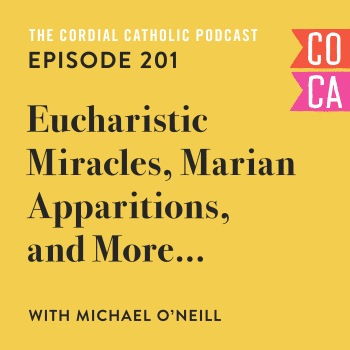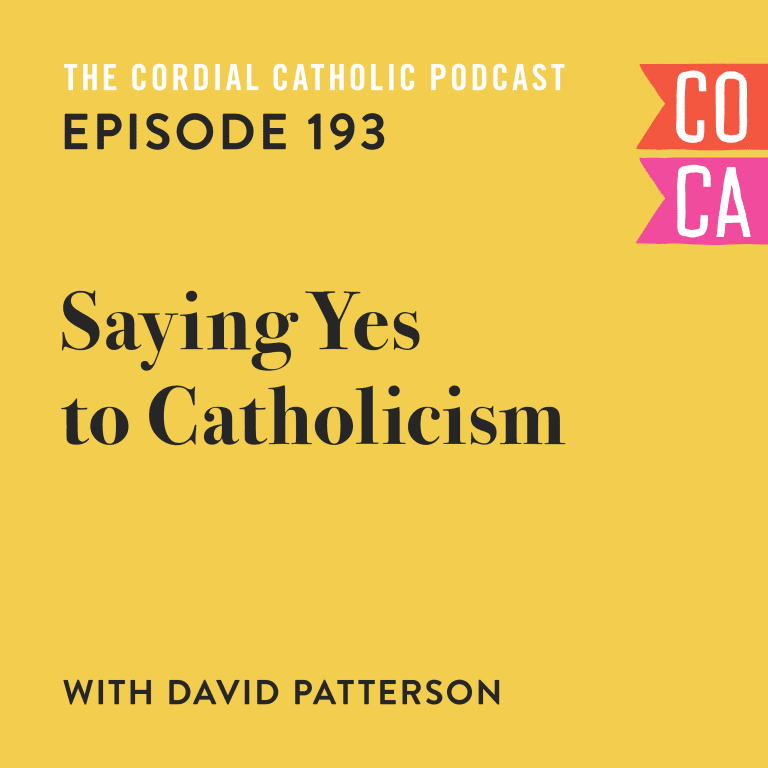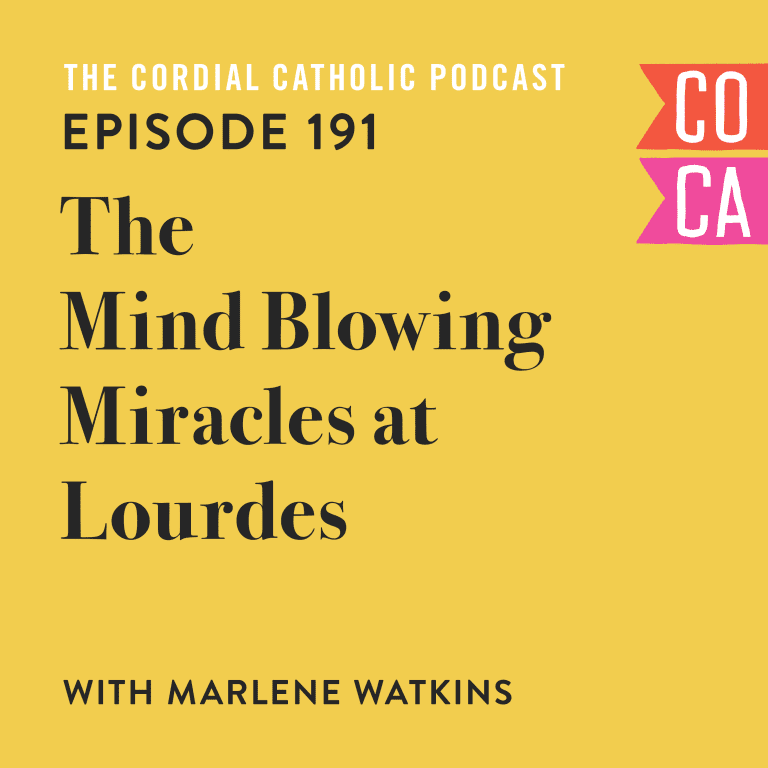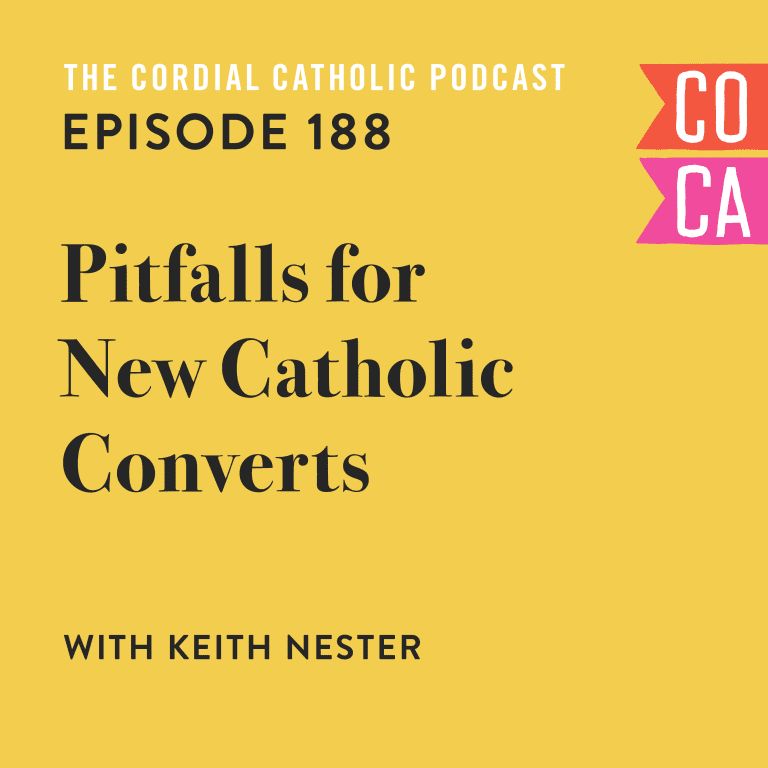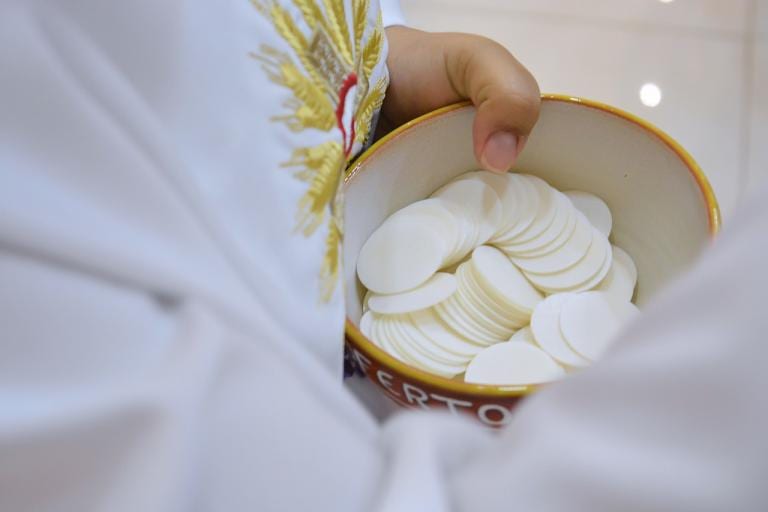
OK, cheeky title aside, good apologetics is never about winning an argument but rather about moving hearts and winning souls. In 1 Peter 3:15, the apostle writes,
always be ready to make a defense to everyone who asks you to give an account for the hope that is in you, yet with gentleness and reverence.
Our apologetics, our explaining the faith, is about giving an account for our hope, not winning an argument but when it comes to issues that divide Christians, like the Eucharist, for example, it’s important that we can defend our beliefs in a way that is coherent, that is Scriptural, and that is easy to understand.
What follows is a conversation I had with a good evangelical friend of mine. If you ask him, I certainly didn’t win the argument but did I move his heart? Did I present ideas from ancient Christianity that he hadn’t heard before? I can only hope! After all, as an evangelical convert to Catholicism myself, these were ideas that I hadn’t heard when I was in his position; these are things, like the idea that Catholics really consume the flesh and blood of Jesus, that I simply had never heard before.
Our conversation began with the issue of biblical interpretation and my friend took a position that is common amongst evangelical Christians; it was the same thing I used to believe: that the Bible can be read, with the help of the Holy Spirit, and plain and obvious conclusions can be made. In other words, there is a plain sense meaning to Scripture that any Christian regardless of status or stature can read and understand if they have a soft heart and are truly seeking to understand.
I disagreed.
I brought up the fact that there are thousands of Christian denominations that can’t agree on all kinds of things like how we’re saved, what baptism does, what marriage and divorce mean, and when life begins. These are major issues and Christians in all of these different groups would claim to approach Scripture prayerfully, with a soft heart, truly seeking to learn what it means.
Yet come to wildly differing conclusions.
So I brought up the Eucharist.
The Eucharist, in my opinion, is a great place to start if you’re talking about biblical interpretation. First and foremost, because the passages surrounding Jesus giving his flesh and blood to his followers are quite clear in the Gospels and in the writings of Paul. They aren’t dressed up in fancy, theological language and so when you’re talking about a plain sense interpretation of what Jesus is saying it’s pretty difficult to squirm your way out of taking him at his word.
And, second, because we can see how unanimous the Early Christians were in understanding that Jesus meant what he said.
A hypothesis that says there’s a plain sense meaning to Scripture yet Jesus wasn’t speaking about consuming his literal flesh and blood has to account for the fact that the first Christians universally understood him literally.
Where they mistaken? And how would we account for the Holy Spirit leading his church astray so quickly after it began?
Of course, all good apologetics, all good conversations about faith, begin by asking a lot of questions. We must, in order to understand, find out exactly where our conversation partners are coming from. In this case, I was fortunate enough to have been an evangelical Christian—a lot of these arguments, a lot of the perspective my friend held, were the very same arguments and perspectives that I held too and after some preliminary question asking I walked through a compelling interpretation of John 6.
What’s Going on in John 6…
John 6 is an incredible chapter in the book of John and underpins, in large part, what the Early Christians, as well as Catholics and Orthodox today, understand about the Eucharist.
The first thing that happens in John 6, it’s worth noting, is the miraculous feeing of the five thousand (John 6:1-15). Jesus’ followers are hungry and without food. Miraculously, Jesus takes only a handful of loaves and fishes and multiplies them, making enough food to feed all those gathered. It’s a miracle reminiscent of the manna that God sent the Israelites as they wandered in the wilderness. It’s likewise reminiscent of the wine which Jesus multiplied earlier in the Gospel of John. And, I argued to my friend, it’s meant to be.
Jesus then walks on water.
What is clear, I said, is that Jesus is demonstrating his power over the natural world. And, in the bread (and the wine), foreshadowing the Eucharist which he speaks of just a few verses later.
And then we get to the heart of the matter.
Explaining to his Jewish followers that they’re only following him because they want to be fed again he brings up the idea of heavenly food. The Jews want a sign, they want to be fed again, like their ancestors were in the wilderness but Jesus responses by saying, instead, “I am the bread of life.” Telling his followers that if they come to him they will never hunger or thirst. (John 6:35).
When his followers push back—after all, this is Jesus, the son of Joseph, he didn’t come from heaven—he doubles down and says that he is, indeed, the bread of life and that he will give his flesh for the “life of the world.” (51)
“How can this man give us his flesh to eat?” his followers ask, at which point Jesus makes himself very clear,
Very truly, I tell you, unless you eat the flesh of the Son of Man and drink his blood, you have no life in you.” (53)
And, “my flesh is true food and my blood is true drink.” (55)
So far, in a plain sense understanding of these Scriptures, an evangelical would be hard-pressed to come to any conclusion except that Jesus was speaking literally; that he meant for his followers to truly gnaw (as the Greek word implies) his actual flesh and drink his actual blood. It’s shocking, and as we see, his followers were rightly shocked.
Verse 60 tells us, “many of his disciples heard it and said, ‘This teaching is difficult, who can accept it?'”
Here, a plain sense understanding of the text doesn’t equate to, “Jesus was speaking symbolically” but that his followers immediately understood him to be speaking quite literally. Otherwise, why would this teaching be so difficult? To a good observant Jew, the idea of eating human flesh and drinking blood would have been disgusting, to say the least. If they understood Jesus to have been speaking metaphorically it wouldn’t have been such an issue.
And, remarkably, even though Jesus is quick to correct or clarify when his disciples misunderstand him (this happens often in the Gospels) here he makes no attempt. In fact, after his clarification we’re told that “many of his disciples turned back and no longer went about with him.” (66)
Important here, is to understand what Jesus said to his disciples when they complained that it was too difficult of a teaching. He did not say, “you misunderstand me, you don’t have to literally eat my flesh,” or, “I was just speaking about the crucifixion and giving my flesh on the cross, you don’t really have to eat or drink it,” or, “I was just speaking spiritually” as I would’ve understood as an evangelical.
Instead, what Jesus says is, “it is the spirit that gives life; the flesh is useless. The words I have spoken to you are spirit and life.” (63)
In other words, his teaching about really eating his flesh and drinking his blood are “spirit and life” and those that have a difficult time of it are thinking merely in “fleshly” terms, not in terms of the miraculous, spiritual realities of God.
It’s worth nothing here that I may have pushed back, as an evangelical, to say that Jesus claiming “the flesh is useless” undermines his entire exposition about eating his flesh and drinking his blood. But clearly that can’t be the case. If he meant that the flesh we must eat is useless then what about the cross? Was his flesh, given up for us, useless on the cross? He can’t be exhorting us to eat his flesh and then call it useless a few movements later, here he clearly intends flesh to mean something else and, later in John, he also uses the term “flesh” to mean earthly thinking.
What About the Last Supper Narratives?
While a plain sense reading of John 6 seems plainly straightforward Jesus is no less clear when he institutes the Eucharist at the Last Supper. Here, Christians universally acknowledge that Jesus is establishing a covenant meal which should be done in remembrance of him. Communion is a Christian universal norm. But was the Eucharist, or Communion, that Jesus was establishing merely symbolic?
His words contain no indication of that.
In Matthew 26:26,
Now as they were eating, Jesus took bread, and blessed, and broke it, and gave it to the disciples and said, “Take, eat; this is my body.”
In Mark 14:22,
And as they were eating, he took bread, and blessed, and broke it, and gave it to them, and said, “Take; this is my body.”
In Luke 22:19,
And he took bread, and when he had given thanks he broke it and gave it to them, saying, “This is my body which is given for you. Do this in remembrance of me.”
In Paul’s account in 1 Corinthians 11:23-24,
For I received from the Lord what I also delivered to you, that the Lord Jesus on the night when he was betrayed took bread, and when he had given thanks, he broke it, and said, “This is my body which is for you. Do this in remembrance of me.”
Christ, it seems, was incredibly clear not only in John 6—that we must eat his flesh—but in the institution of Communion as well. Nowhere do we find him saying, “This represents my flesh,” or, “This is a symbol of my flesh,” even though that’s how I, as an evangelical, would’ve certainly interpreted this.
In a plain sense reading.
So plain, I see in hindsight, that I actually had to add words the word “represents” to the narrative to make it fit my understanding.
What Did the First Christians Think?
Finally, we have to ask ourselves what the first Christians took all of this to mean.
Remember, this whole discussion began over a debate surrounding biblical interpretation. Was there a plain sense meaning to the Bible? Could it be easily discerned by anyone with a Bible and a brain? Is that how God intended us to live out our Christianity? Could I simply, as my evangelical friend asserted, approach the Bible with a soft, prayerful heart and come to the natural meaning hidden there in the text?
On dozens of issues of importance to Christianity it seemed like this wasn’t, practically, possible. As a former evangelical, I knew this way of understanding the Bible wasn’t ultimately fruitful. Instead, in becoming Catholic, I found an incredible gift in the Church that claimed a unique authority to actually interpret and teach the Word of God.
And so, in our conversation, I brought up the Eucharist.
I knew, as a former evangelical, that we didn’t believe that the elements of Communion—the bread and the wine—became Jesus’ flesh and blood (not to mention soul and divinity!). But I knew, at the same time, that the passages of Scripture that refer to this process were quite clear, in quite plain language and that the first Christians understood this to be the case too.
So, I decided to suggest we look here.
I’ve already shown, I think, that Jesus was quite clear when he said, in John 6, that we must eat his flesh and drink his blood. When his followers were disgusted he simply doubles down; he calls their fleshly thinking unprofitable and doesn’t blink when many of them walk away.
In the Last Supper narratives where Christ returns to this idea we see, in each and every account, him telling us clearly that we need to eat his flesh. “This is my body,” he says time and time again.
But what did the first Christians think? This is a crucial point. Crucial, because if the teaching of Jesus and the apostles about the Eucharist are plain and clear then surely the very first Christians to write about it must’ve understood it plainly and clearly.
After all, if what Jesus meant, according to my evangelical roots, was that the Lord’s Supper was merely symbolic, then his plain and clear words about it should’ve been interpreted that way by the first Christians. Otherwise, the only logical hypothesis, is that either God abandoned his church almost immediately (i.e., the Christians who learned from the apostles got it wrong on the Eucharist) or the Eucharist was never meant to be understood as merely symbolic.
First, we start with Paul, right in the New Testament itself, who writes,
The cup of blessing that we bless, is it not a participation in the blood of Christ? The bread that we break, is it not a participation in the body of Christ? – 1 Corinthians 10:16
Next, we hear from St. Ignatius of Antioch who, when he was a boy, learned straight from the Apostle John. He writes, as early as 80AD,
Consider how contrary to the mind of God are the heterodox in regard to the grace of God which has come to us. They have no regard for charity, none for the widow, the orphan, the oppressed, none for the man in prison, the hungry or the thirsty. They abstain from the Eucharist and from prayer, because they do not admit that the Eucharist is the flesh of our Savior Jesus Christ, the flesh which suffered for our sins and which the Father, in His graciousness, raised from the dead.
Notice that Ignatius is actually pointing out heretics who are heretical (i.e., bad Christians) because they don’t believe in the literal flesh and blood of Jesus in the Eucharist.
St. Justin Martyr, a pagan convert, wrote one of the first apologetic texts on Christianity before his death and included this description of the Mass in the mid 100’s AD,
This food we call the Eucharist, of which no one is allowed to partake except one who believes that the things we teach are true, and has received the washing for forgiveness of sins and for rebirth, and who lives as Christ handed down to us. For we do not receive these things as common bread or common drink; but as Jesus Christ our Savior being incarnate by God’s Word took flesh and blood for our salvation, so also we have been taught that the food consecrated by the Word of prayer which comes from him, from which our flesh and blood are nourished by transformation, is the flesh and blood of that incarnate Jesus.
St. Irenaeus, Bishop of Lyons, writes in 180 AD,
[Christ] has declared the cup, a part of creation, to be his own Blood, from which he causes our blood to flow; and the bread, a part of creation, he has established as his own Body, from which he gives increase to our bodies.
St. Clement of Alexandria in 200 AD wrote,
The Blood of the Lord, indeed, is twofold. There is His corporeal Blood, by which we are redeemed from corruption; and His spiritual Blood, that with which we are anointed. That is to say, to drink the Blood of Jesus is to share in His immortality. The strength of the Word is the Spirit just as the blood is the strength of the body. Similarly, as wine is blended with water, so is the Spirit with man. The one, the Watered Wine, nourishes in faith, while the other, the Spirit, leads us on to immortality. The union of both, however, – of the drink and of the Word, – is called the Eucharist, a praiseworthy and excellent gift. Those who partake of it in faith are sanctified in body and in soul. By the will of the Father, the divine mixture, man, is mystically united to the Spirit and to the Word.
St. Cyprian, the first Bishop of Carthage and the first recorded African martyr wrote this exhortation to Christian unity around 250 AD, noting that the Eucharist—the flesh of Jesus—shouldn’t be consumed anywhere but inside the community of Christians,
So too the the sacred meaning of the Pasch lies essentially in the fact, laid down in Exodus, that the lamb – slain as a type of Christ – should be eaten in one single home. God says the words: ‘In one house shall it be eaten, ye shall not cast its flesh outside.’ The flesh of Christ and the Lord’s sacred body cannot be cast outside, nor have believers any other home but the one Church.
St. Athanasius, Bishop of Alexandria and famous for combating the Arian heresy wrote this in 373 AD,
You shall see the Levites bringing loaves and a cup of wine, and placing them on the table. So long as the prayers of supplication and entreaties have not been made, there is only bread and wine. But after the great and wonderful prayers have been completed, then the bread is become the Body, and the wine the Blood, of our Lord Jesus Christ. ‘And again:’ Let us approach the celebration of the mysteries. This bread and this wine, so long as the prayers and supplications have not taken place, remain simply what they are. But after the great prayers and holy supplications have been sent forth, the Word comes down into the bread and wine – and thus His Body is confected.
Finally, St. Augustine, Bishop of Hippo in North Africa, writes this,
You ought to know what you have received, what you are going to receive, and what you ought to receive daily. That Bread which you see on the altar, having been sanctified by the word of God, is the Body of Christ. The chalice, or rather, what is in that chalice, having been sanctified by the word of God, is the Blood of Christ.
And these quotations are only a small sampling.
Of course, any student of patristics or an evangelical apologist could find quotations from Church Fathers like these first Christians, who treated the Eucharist, in some sense, as symbolic. This might seem like a victory for the non-Catholic and evidence that there wasn’t unanimous consent about what the Eucharist was in the Early Church but this simply isn’t the case.
In reality, two things are at play here.
First, like the Christian understanding of the Trinity (which wasn’t codified until the 381 AD), not all Christians immediately understood exactly how the Eucharist was spiritually and physically Jesus. And, second, it is a symbol. In a way that Christians cannot and will not even understand until we die or Christ returns, the Eucharist does actually symbolize Christ and become Christ and just because that’s a mystery that might be difficult for the first Christians to articulate it doesn’t mean they disbelieved in the Eucharist as Jesus’ real flesh and blood.
In fact, that’s just the crux of it: none of the Early Christians wrote about their disbelief in the Eucharist. If there was some disagreement, if there was a group of Christians who learned the truth about the Eucharist—that Jesus was only speaking symbolically; that he didn’t mean his actual flesh—their writings show up nowhere in the Early Church.
How to Debate an Evangelical on the Eucharist and Win?
Remember that our conversation began over interpreting the Bible.
If the Bible can be plainly interpreted by anyone with a prayerful, soft heart then how come I, as a former evangelical, approaching my Bible prayerfully, came to different conclusions than my Catholic and Orthodox friends on the nature of the Eucharist?
A look through John 6, through the Gospel narratives, and through Jesus’ own words seem to indicate that most plainly he was offering his actual flesh and blood to his followers, to eat and drink.
Since the evangelical conclusion is different—he was speaking metaphorically; he didn’t really mean it—this poses a challenge to the plain sense meaning of Scripture.
To settle this debate we can look to the writings of the very first Christians. Surely, if the Eucharist were plainly intended to be symbolic and not the actual flesh and blood of our Lord then those who formed the first churches—the first Christian communities—would’ve understood it this way. Merely symbolic.
But this isn’t what we see. Instead, starting with Paul in his letter to the Corinthians and extending onward and outward, we see the very early Christians writing about Jesus’ actual flesh and blood in the Eucharist. With absolutely no believing Christians denying this reality.
(In fact, those that deny this reality are mentioned as heretics in several examples.)
So, how can we debate an evangelical on the Eucharist and win? Well, ultimately we can’t. As I said in the beginning, apologetics is never about winning an argument but it is about moving hearts, and ultimately, winning souls. And if we can move the needle even a little bit towards the truth found in the Catholic Church then we have won. I can tell you, from first-hand experience, that all of this information, as an evangelical, was simply overwhelming. I didn’t know what the Catholic Church taught about the Eucharist, I hadn’t heard of the Early Church Fathers, and I was completely ignorant of the fact that following Christ’s resurrection, for 1,500 years, Christians were unanimous in their belief in his presence in the Eucharist.
And, when I found out, it blew my mind. And changed my life.
That Jesus was speaking plainly, that his followers understood that, and that those who came after in continuity all believed the exact same thing. And that this belief is still held by Catholics the world over, to this day.
As someone deeply in love with Christ and his Church—and I hope that’s you, too!—what we can do best is share this; and share the reason for the hope that we have. And the deep and abiding and mind blowing closeness that is our relationship with Jesus Christ in the Eucharist.
Amen.



